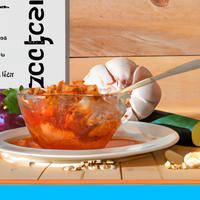
1 serving (30 grams) contains 5 calories, 0.0 grams of protein, 0.0 grams of fat, and 1.0 grams of carbohydrates.

Log this food in SnapCalorie

Nutrition Information
Calories |
40.0 | ||
|---|---|---|---|
% Daily Value* |
|||
| Total Fat | 0 g | 0% | |
| Saturated Fat | 0 g | 0% | |
| Polyunsaturated Fat | 0 g | ||
| Cholesterol | 0 mg | 0% | |
| Sodium | 2400 mg | 104% | |
| Total Carbohydrates | 8.0 g | 2% | |
| Dietary Fiber | 2.4 g | 8% | |
| Sugars | 4.0 g | ||
| protein | 0 g | 0% | |
| Vitamin D | 0 mcg | 0% | |
| Calcium | 40.0 mg | 3% | |
| Iron | 0.8 mg | 4% | |
| Potassium | 160.0 mg | 3% | |
* Percent Daily Values are based on a 2,000 calorie diet. Your daily values may be higher or lower depending on your calorie needs.
Food Attributes
Source of Calories
About Israeli pickle
Israeli pickles, known as "hamutzim," are a staple in Israeli cuisine. Typically made from small cucumbers, these pickles are brined with water, salt, and often flavored with garlic, dill, and slices of lemon. Unlike vinegar-based pickles, Israeli pickles rely on lacto-fermentation, giving them a tangy, natural flavor and probiotic benefits that support gut health. Low in calories and fat, they serve as a refreshing, crunchy side dish or sandwich topper in Middle Eastern dishes like falafel and shawarma. While they are a nutritious choice, their high sodium content means they should be consumed in moderation. Overall, Israeli pickles are a flavorful, versatile addition to meals and offer digestive health benefits when enjoyed responsibly.



